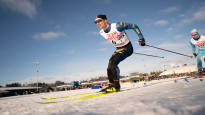The executive director of the skiing association, Ismo Hämääinen, says that if necessary, the incident will be investigated together with the Sports Ethics Center.
Executive Director of the Ski Association Ismo Hämäläinen regrets the incident that took place in the Finnish Cup competitions over the weekend. The competition situation strained those who represented the Puijo Ski Club Iivo Niskanen and having skied in Kuusamo’s Erä-Veikoi Kalle Parantainen lie on sunday.
According to Iivo Niskanen, Kalle Parantainen wedged in front of him when Niskanen was catching up with the rest of the group.
– The man from Kuusamo jumped in front and started to wedge me to the left. I knew it was soft, and a pole went into it, and I got to the back of the queue, Niskanen told after skiing.
Kalle Parantainen explained the situation to Urheilu by phone on Sunday evening. According to Parantainen, Niskanen barked at him and kicked him with a ski on the last downhill section.
– Emotions can run hot in a competitive situation. It’s always unfortunate when something like this happens, states Ismo Hämäläinen of the Ski Association.
According to him, the situation was already dealt with at the venue after the race, and the judges’ council gave a verbal remark on the matter.
– We assess the need for further measures based on the competition report of the judges’ council. The Council makes decisions in dispute situations. There is a possibility for a follow-up investigation if the athletes are not satisfied with the solution. If necessary, the Sports Ethics Center also intervenes in the situation, Hämäläinen adds.
The rules of ski competitions define how to behave on the track. According to the executive director of the skiing association Ismo Hämääläinen, the athletes are primarily guided by laws and regulations, then by the rules interpreted by the referee council, and finally also by the good ones.
Ismo HäĤläinen understands that in an intense competitive situation, concentration and working habits can become strained.
– However, top athletes are always some kind of role models. You could say that they are even obliged to use it accordingly, says Hämä¤läinen.
